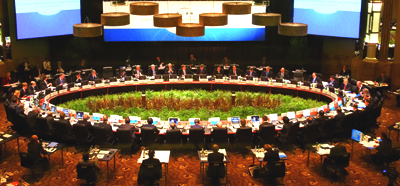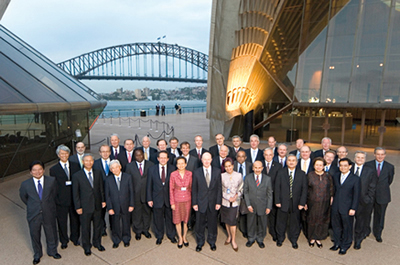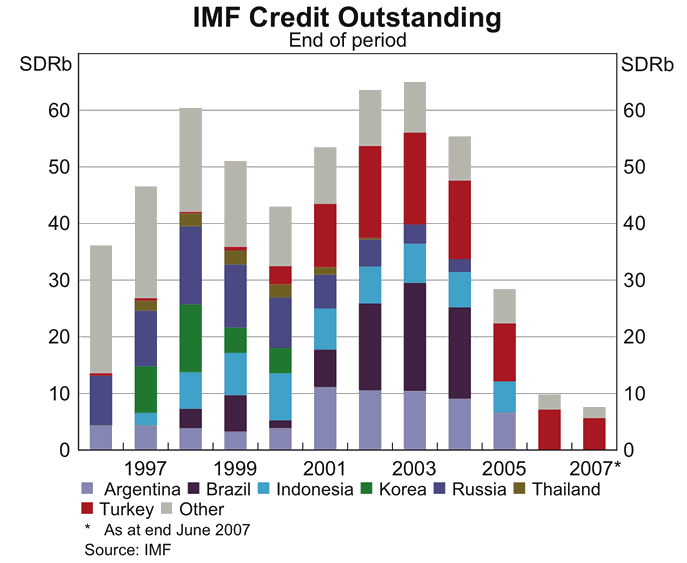Reserve Bank of Australia Annual Report – 2007 International Financial Co-operation
The Reserve Bank interacts with its counterparts in other countries across the spectrum of its activities, both on a bilateral basis and through its involvement in international groupings and international institutions. The Bank continued to participate in the International Economic Policy Group, which is the Australian government body responsible for exchanging information on and co-ordinating Australia's approach to international economic policy matters.
Two key initiatives in the international co-operative efforts of the Reserve Bank during 2006 were its involvement in the chairing of the G-20 forum and the bilateral exchange program with Bank Indonesia, which is conducted under the auspices of the Australian Government's Government Partnership Fund. These and other aspects of the Reserve Bank's international co‑operation activities are described below.
Group of Twenty (G-20)
The G-20 has been meeting since 1999 to discuss matters of international economic and financial significance for systemically important advanced and emerging market countries. Representatives of finance ministries and central banks from the 19 member countries and the European Union participate in the meetings, as do representatives from the IMF and World Bank.
Australia was chair of the G-20 during 2006, with the role shared between the Australian Treasury and the Reserve Bank. The year culminated with a meeting of finance ministers and central bank governors in Melbourne in November. The Governor joined the Treasurer in chairing the meeting and the Assistant Governor (Economic) – the Reserve Bank's G-20 Deputy – was also a participant. In addition, the Reserve Bank provided substantial logistical and technical support with over 20 staff from across the Bank acting as liaison officers for the attending central bank governors and also for the Managing Director of the IMF. The cost to the Reserve Bank of its involvement in the G-20 in 2006/07 is estimated to have been around $700,000.
The agenda of the November meeting covered the global economic outlook, the functioning of global energy and minerals markets, the financial implications of demographic change, and reform of the IMF and World Bank. In each of these areas the discussion benefited from the broad experience and range of perspectives among the membership and the relatively informal dialogue that is a characteristic of the G‑20. One of the topics that received particular attention was the financial implications of demographic change. This was the subject of a G-20 workshop hosted by the Reserve Bank in Sydney in July 2006. On the topic of IMF and World Bank reforms, the G-20 meetings helped to develop the broad consensus that led to the IMF Governors agreeing, in September 2006, to increase the voting share of four of the most under-represented IMF members (China, Korea, Mexico and Turkey).
In 2007, Australia has remained closely involved in setting the G-20's agenda through its membership of the G‑20 management troika, an oversight committee of G-20 deputies that also includes the 2007 chair (South Africa) and the 2008 chair (Brazil). The G-20's agenda for 2007 is focused on the financial stability aspects of commodity markets, the relationship between fiscal policies and economic development and poverty reduction, as well as its ongoing emphasis on IMF reforms.

| Date | Event | Location |
|---|---|---|
| 2006 | ||
| July | G-20 Workshop on Demography and Financial Markets | Sydney |
| October | Second Meeting of G-20 Finance and Central Bank Deputies | Sydney |
| November | Meeting of G-20 Finance Ministers and Central Bank Governors | Melbourne |
| 2007 | ||
| March | G-20 Workshop on Reform of Bretton Woods Institutions | Rio de Janeiro |
| March | First Meeting of G-20 Finance and Central Bank Deputies | Pretoria |
| May | G-20 Workshop on Commodities and Financial Stability | Washington |
| July | G-20 Workshop on Fiscal Policy | Istanbul |
| September | Second Meeting of G-20 Finance and Central Bank Deputies | Durban |
| November | Meeting of G-20 Finance Ministers and Central Bank Governors | Cape Town |
Bank for International Settlements (BIS) and Associated Committees
The Reserve Bank continued to participate in the bi-monthly meetings of governors and the associated committees of the BIS. These focus on a wide range of monetary, financial and central banking issues, as well as on global macroeconomic developments. In November 2006, these BIS meetings were held in Sydney to coincide with the hosting of the G-20 forum by Australia and involved 45 governors of central banks. Reserve Bank staff provided significant logistical support for this event.
During the year, the Governor participated in the two meetings of the BIS Asian Consultative Council (ACC). The ACC is responsible for overseeing the work program of the BIS Asian office in Hong Kong, including the office's research agenda. Over the past year, the Reserve Bank contributed directly to this research by co-authoring two articles that were published in the BIS Quarterly Review. Some of this research was undertaken by a Reserve Bank officer during a four-month secondment to the BIS Asian office in the second half of 2006.

The Assistant Governor (Financial Markets) represented the Reserve Bank on two BIS committees, namely the Committee on the Global Financial System (CGFS) and the Markets Committee. The CGFS examines issues relevant to the stability of financial markets and the global financial system, while the focus of the Markets Committee is on the short-run implications of particular current events for the functioning of financial markets. The CGFS commissioned three working groups in 2006/07 in which Bank staff participated. One of these working groups studied the relationship between institutional investors, global savings and asset allocation; it released its report in February 2007. The report highlighted the impact of recent and prospective regulatory and accounting changes on the investment decisions of institutional investors. Of the two other working groups, one is considering the implications for financial stability of the development of local-currency bond markets, while the other is examining issues surrounding the private equity and leveraged finance markets. Both working groups are expected to release their reports during 2007/08.
The Reserve Bank also continued to second senior staff to the BIS. In February 2007, a member of staff from Economic Group commenced a two-year secondment and a member of staff from Audit Department was seconded to the Internal Audit Department of the BIS for nine months.
Executives’ Meeting of East Asia‑Pacific Central Banks (EMEAP)
EMEAP is the primary forum for co-operation among central banks in the Asia-Pacific region. EMEAP governors met in the Philippines in June 2007, where they discussed issues surrounding the implications of reserves accumulation for EMEAP economies as well as the possible impact on EMEAP economies of any rise in global risk aversion. EMEAP governors also met with representatives from the Eurosystem central banks while they were in Sydney attending the BIS bi‑monthly meetings in November 2006. Governors discussed key issues confronting policy‑makers in both regions, including: the link between the integration of emerging economies into the world economy and global inflation; global imbalances and their implications for financial stability; and regional financial integration, with a focus on the ongoing processes of financial integration in the Asia-Pacific region and Europe.
A key development in EMEAP during the year was the creation of a new committee of EMEAP deputies, to examine issues relating to monetary and financial stability in the region in greater detail. This new EMEAP Monetary and Financial Stability Committee held its first meeting in April 2007. Discussions focused on global imbalances, asset price cycles and monetary policy, the implications of demographic change for financial markets, and the short-lived effect of the turbulence in stock markets in the early part of 2007.
The EMEAP process also entails three working groups, which cover financial markets, banking supervision, and payments and settlements issues. The Head of Payments Policy Department at the Reserve Bank was the chair of the Working Group on Payments and Settlement Systems for part of 2006/07, including for a meeting of the Group held in Sydney in October. One of the issues on which the Group made progress during the year related to oversight of SWIFT, the messaging infrastructure utilised globally for most foreign exchange and correspondent banking. EMEAP has been seeking to obtain improved access to oversight information on SWIFT and is working with SWIFT's lead overseer, the National Bank of Belgium, towards achieving this aim.
The Working Group on Financial Markets continued to monitor and analyse developments in individual country markets during the four meetings it held during 2006/07, one of which was hosted by the Reserve Bank. There was also ongoing work undertaken by this Group relating to the Asian Bond Funds, which were established to assist the development of regional bond markets. Both the Korean and Indonesian country funds were opened to private-sector investment during the year (see the 2005 Annual Report for more detail on the Asian Bond Funds). The Group also continued its regular bi-annual meetings on foreign exchange with representatives from the Federal Reserve Bank of New York, European Central Bank, Bank of England and Bank of Canada.
The Working Group on Banking Supervision continued to devote much of its time to issues relating to the implementation of the new Basel Capital Framework in the Asia-Pacific region. To facilitate this, the Group maintained its interaction with the Basel Committee on Banking Supervision, including holding one high-level meeting with Committee members in Hong Kong in November 2006. Consistent with efforts to enhance regional surveillance, the Working Group devoted more time to reviewing and comparing macro-prudential surveillance techniques in member countries and reporting on the condition of member countries’ banking systems. The Working Group also established a number of Interest Groups to explore technical issues in more detail, including one co-ordinated by the Reserve Bank on macro stress-testing techniques.
Financial Stability Forum (FSF)
Since being formed eight years ago, the FSF has worked to promote international financial stability, improve the functioning of financial markets and reduce the tendency for financial shocks to spread from country to country. The FSF's mandate is to assess vulnerabilities affecting the international financial system and to identify and oversee action needed to address these vulnerabilities. FSF members meet twice a year to co-ordinate their efforts and share information. Membership of the FSF comprises senior representatives from central banks, finance ministries and supervisory agencies of the G7 countries, and central bank governors from Australia, the ECB, Hong Kong, the Netherlands, Singapore and, more recently, Switzerland, which was invited to become a member of the FSF in January 2007. Other participants in the FSF include representatives from the BIS, IMF, World Bank and other international forums.
In response to a request by the G7 finance ministers and central bank governors, the FSF updated its 2000 Report on Highly Leveraged Institutions. The updated report recommends action by financial authorities, counterparties, investors and hedge fund managers to strengthen protection against potential systemic risks relating to hedge funds and other highly leveraged institutions. The report recognised the contribution hedge funds have made to financial innovation and market liquidity, but noted that there are heightened risk measurement, valuation and operational challenges for market participants.
International Monetary Fund (IMF)
In 2006 Australia concluded its first Financial Sector Assessment Program (FSAP) with the IMF. As noted in the 2006 Annual Report, a core element in this process was an evaluation of Australia's compliance with a number of internationally accepted standards and codes relating to banking, insurance, securities regulation and systemically important payment systems. A second element was stress-testing of the financial system – a task that was jointly undertaken by IMF staff, the Australian authorities and the five largest Australian banks, with the Reserve Bank playing the key co-ordinating role. The main findings of the Australian assessment were released by the IMF in October 2006, with the detailed assessments of standards and codes released in November. The assessment concluded that Australia's financial sector is mature and strong, and that both the banking system and the regulatory and supervisory structure are sound. RITS was found to be a sound and efficient payments system that fully complies with the international standards.

The IMF's FSAP initiative is part of a broader shift in the focus of its activities, away from lending activities towards other areas of its mandate, particularly surveillance. This partly reflects a decline in the IMF's lending in recent years, as most of those countries affected by the financial crises of the past decade have repaid their IMF loans and as buoyant global conditions have resulted in little demand emerging for new large-scale borrowing.
As the IMF strengthens its surveillance activities, capital market developments, global financial stability and financial market supervision are becoming an increasingly significant part of its work. The Reserve Bank has been a strong supporter of efforts to improve the effectiveness of the IMF's advice in these areas. The Bank has participated in a number of initiatives designed to tap in to the expertise of practitioners in the financial and capital markets arena, particularly in the Asian region. The Assistant Governor (Financial Markets) and Head of Domestic Markets Department participated in two such seminars hosted by the IMF in 2006/07, one on the IMF's exchange rate analysis and the other on the role of hedge funds in Asian financial markets.
On a parallel track, the Reserve Bank has supported Australia's efforts to modernise the IMF's governance structure, especially in the areas of voting and representation, so that it better reflects both the changing dynamics of the global economy and the evolving role of the IMF. As a result of the decision at the 2006 IMF Annual Meetings to increase the voting share of four of the most under-represented emerging market economies, Korea (which is one of the countries in Australia's constituency group) saw its voting share of total IMF votes rise from 0.76 per cent to 1.34 per cent.
Government Partnership Fund (GPF)
As described in the 2006 Annual Report, the Reserve Bank has an extensive capacity-building program in place with Bank Indonesia under the Australian Government's GPF. Following the successful completion of the program's first year in 2006, the 2007 program has seen an increase in the exchange of officers.
While the program remains focused on capacity building in the areas of monetary policy and financial stability, the scope has broadened to include most other areas of central banking, including payments systems and risk management. Reflecting the broader coverage, visits by Bank Indonesia officers have moved from a fixed three-month period to more flexible shorter periods, depending on the nature of the work. As a result, the number of Bank Indonesia visitors to the Reserve Bank is expected to more than double in 2007, to around 35.
There will also be a substantial number of short-term visits by Reserve Bank staff to Indonesia. In the first half of 2007 Reserve Bank officers who visited Indonesia undertook workshops and training sessions in the areas of payments system oversight, risk management and the implementation of a business liaison program in Indonesia, along the lines of the Reserve Bank's program. The Head of Financial Stability Department also visited Indonesia to give a series of presentations on Australia's experience of participating in the IMF's FSAP; stress-testing methodologies; and, in connection with the establishment of an Indonesian Financial System Stability Forum, the functioning of the Australian Council of Financial Regulators. A common theme of these visits has been the exchange of information on both the technical aspects and organisational structure supporting core central banking responsibilities, in line with the overall aim of the GPF program to strengthen Indonesia's economic governance and public-sector management capabilities.
Asia-Pacific Economic Cooperation (APEC)
The Reserve Bank's involvement in APEC has centred on the financial sector and capital market initiatives undertaken by the grouping during the year. The Deputy Governor, Assistant Governor (Financial System) and other senior management presented to and attended workshops on financial sector reform, bond market development and the APEC Future Leaders’ Meeting. As in previous years, the Bank provided the HC Coombs Centre as the venue for the Future Leaders’ Meeting.
South Pacific Central Bank Governors
The Reserve Bank places considerable importance on promoting relations with the central banks of the South Pacific region. In addition to the exchange of staff and technical visits by Reserve Bank officers, the central bank governors of the six Pacific Island nations that have their own currencies (Fiji, Papua New Guinea, Samoa, Solomon Islands, Tonga and Vanuatu) meet annually to discuss matters of mutual interest with their counterparts from Australia and New Zealand. This year's meeting in December 2006 was held in Wellington, with representatives from the Pacific Financial Technical Assistance Centre and the IMF also participating. The implications for the Pacific Island economies of global economic developments and the new Basel Capital Framework were the main issues discussed, as well as the management of foreign exchange reserves and the role of remittances in the Pacific region.
Bilateral Relations and Co-operation
In addition to the GPF program with Bank Indonesia, throughout 2006/07 the Reserve Bank maintained an active program of technical co-operation with other central banks, particularly in the Asia-Pacific region. A member of staff returned from a two-year secondment to the National Reserve Bank of Tonga, while another member of staff made a short-term visit there to advise on liquidity management and forecasting. An officer also visited the Bank of Papua New Guinea (BPNG) to provide support on the development of BPNG's risk management policies. These visits were in addition to the frequent electronic communications with central banks throughout the region.
As in previous years, the Reserve Bank received many visitors during 2006/07 from overseas central banks interested in observing how the Bank carries out its responsibilities. This year there were visits from the central banks of the People's Republic of China, Fiji, Nigeria and Thailand.